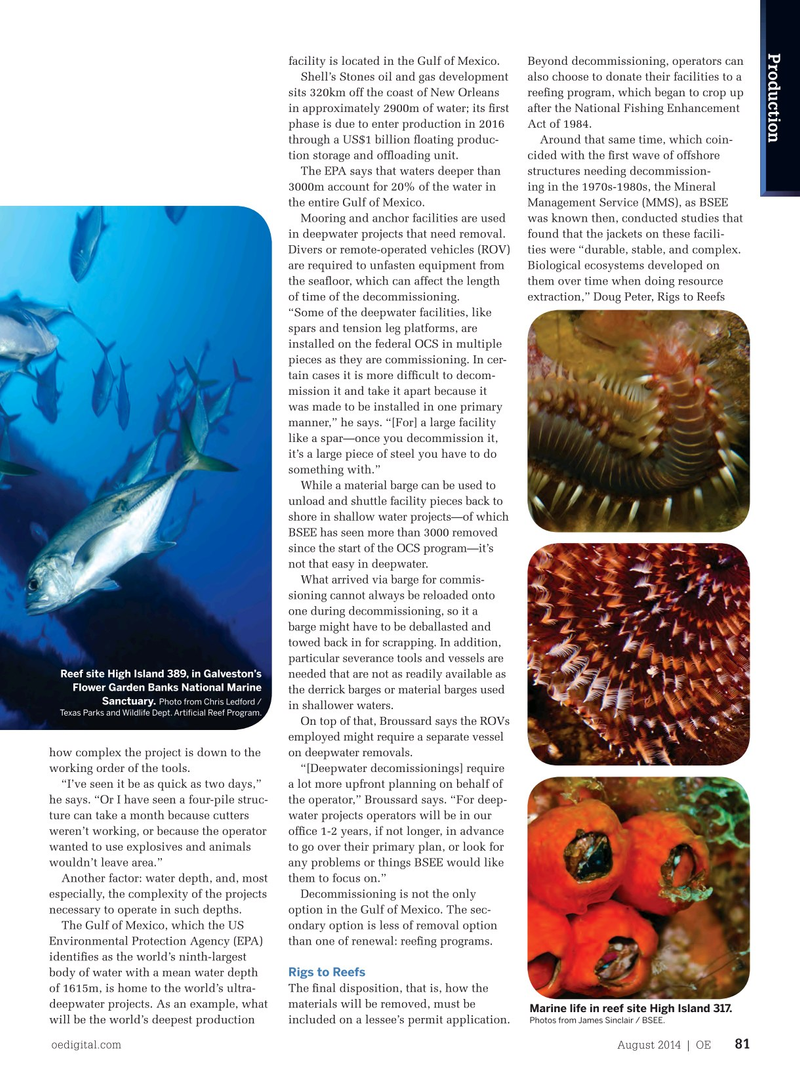
Page 79: of Offshore Engineer Magazine (Aug/Sep 2014)
Read this page in Pdf, Flash or Html5 edition of Aug/Sep 2014 Offshore Engineer Magazine
EyebrowProduction
Beyond decommissioning, operators can facility is located in the Gulf of Mexico. also choose to donate their facilities to a Shell’s Stones oil and gas development reefng program, which began to crop up sits 320km off the coast of New Orleans after the National Fishing Enhancement in approximately 2900m of water; its frst
Sarah Parker Musarra examines
Act of 1984. phase is due to enter production in 2016 decommissioning in the Gulf of
Bringing
Around that same time, which coin- through a US$1 billion foating produc-
Mexico, and how these tion storage and offoading unit. cided with the frst wave of offshore facilities can become fxtures
The EPA says that waters deeper than structures needing decommission- 3000m account for 20% of the water in ing in the 1970s-1980s, the Mineral in the surrounding marine life.
decommissioning the entire Gulf of Mexico. Management Service (MMS), as BSEE
Mooring and anchor facilities are used was known then, conducted studies that in deepwater projects that need removal. found that the jackets on these facili-
Divers or remote-operated vehicles (ROV) ties were “durable, stable, and complex. are required to unfasten equipment from Biological ecosystems developed on to life the seafoor, which can affect the length them over time when doing resource of time of the decommissioning. extraction,” Doug Peter, Rigs to Reefs “Some of the deepwater facilities, like spars and tension leg platforms, are installed on the federal OCS in multiple pieces as they are commissioning. In cer- tain cases it is more diffcult to decom- mission it and take it apart because it was made to be installed in one primary manner,” he says. “[For] a large facility like a spar—once you decommission it, it’s a large piece of steel you have to do something with.”
While a material barge can be used to unload and shuttle facility pieces back to shore in shallow water projects—of which
BSEE has seen more than 3000 removed since the start of the OCS program—it’s not that easy in deepwater.
What arrived via barge for commis- sioning cannot always be reloaded onto one during decommissioning, so it a barge might have to be deballasted and towed back in for scrapping. In addition, particular severance tools and vessels are
Reef site High Island 389, in Galveston’s needed that are not as readily available as
Flower Garden Banks National Marine the derrick barges or material barges used
Sanctuary.
Photo from Chris Ledford / in shallower waters.
Texas Parks and Wildlife Dept. Artifcial Reef Program.
On top of that, Broussard says the ROVs employed might require a separate vessel how complex the project is down to the on deepwater removals. working order of the tools. “[Deepwater decomissionings] require “I’ve seen it be as quick as two days,” a lot more upfront planning on behalf of he says. “Or I have seen a four-pile struc- the operator,” Broussard says. “For deep- ture can take a month because cutters water projects operators will be in our weren’t working, or because the operator offce 1-2 years, if not longer, in advance wanted to use explosives and animals to go over their primary plan, or look for wouldn’t leave area.” any problems or things BSEE would like
Another factor: water depth, and, most them to focus on.” especially, the complexity of the projects Decommissioning is not the only necessary to operate in such depths. option in the Gulf of Mexico. The sec-
The Gulf of Mexico, which the US ondary option is less of removal option
Environmental Protection Agency (EPA) than one of renewal: reefng programs. identifes as the world’s ninth-largest
Rigs to Reefs body of water with a mean water depth
The fnal disposition, that is, how the of 1615m, is home to the world’s ultra- materials will be removed, must be deepwater projects. As an example, what
Marine life in reef site High Island 317.
Photos from James Sinclair / BSEE. included on a lessee’s permit application. will be the world’s deepest production oedigital.com August 2014 | OE 81 080_OE0814_ProdOps1_Rigs-to-Reefs.indd 81 7/22/14 10:14 PM

 78
78

 80
80